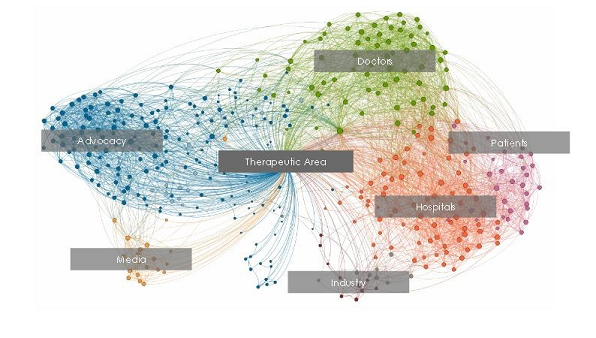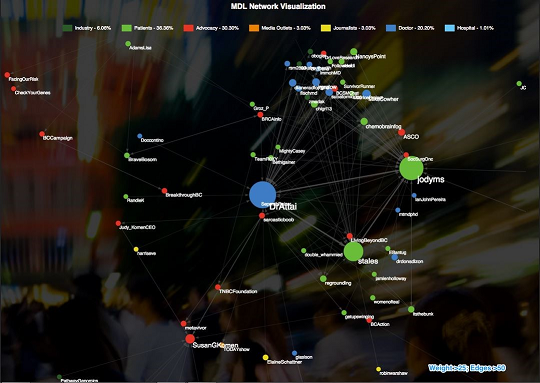Doctors use Twitter to advance health care messaging

For three nights this Spring, an unusual set of fireworks exploded across the social media landscape with implications for public discussions of health, particularly for health care professionals whose work includes crafting messages for patients.
An estimated 746 doctors joined in a twitter chat with the hashtag #cancerfilm in an extended conversation with more than 500 self-described patients, as well as about 12,000 other people who didn't fit either of those labels (but fit 13 other categories.) This three-night, multiplayer dialogue began March 31 and created an "unprecedented" event according to one data junkie, Audun Utengen, of Symplur, LLC. Utengen runs the site www.symplur.com, which provides analytics on healthcare related hashtags.
The jury is still out on whether others will imitate this episode of what is called the "second screen" phenomena in health care. Sports and music fans already tweet comments to each other while athletes and musicians are performing. "Did you see that goal?" But what happened on the three consecutive nights – beginning March 31, was a formal invitation by the US National Cancer Institute (and 18 partner research organizations) for the public to "comment" while watching a public television documentary entitled, "The Emperor of All Maladies," about cancer.
"This opens up a whole new area for conversation in health care," Utengen said in an interview. "This was an explosion of people talking about a disease."
Emperor was a six-hour major television event on the US Public Broadcasting System, PBS, presented by documentary filmmaker Ken Burns, in partnership with WETA, based on the 2010 Pulitzer Prize-winning book by Siddhartha Mukherjee.
Cancer – in the documentary – was portrayed in lethal reality, complete with historic explanations of mistaken ideas and misguided treatments and days when wards full of children faced almost certain death. Some of those on Twitter literally wrote "I'm turning it off now" because they said it was too difficult to watch. Utengen himself, whose family has been touched by pancreatic cancer, said it was not easy to see some images.
But the authenticity pleased some of the patients watching, who tweeted things like, "That's exactly how I felt during chemotherapy" or "I remember losing my hair."
For those who wish to study it, the entire transcript of #cancerfilm is available here. You must scroll to the bottom to set parameters for the time section you wish to read. One social scientist who has been studying social media said parsing the importance from of an event like this is a statistical nightmare. Devin Gaffney is a doctoral student at Northeastern University in Boston, who has studied social media's role in political uprisings, for example.
He said linking "online" conversation to offline behavior for #cancerfilm is tricky. "I think very likely there is a real link there – attention online will likely lead to some degree of attention (and donations, and attitudinal shifts, and improved science literacy), but I don't think it happens in a way that we can directly quantifiably measure." Surveys done months later might be able to pick up an impact, he explained.
During #cancerfilm some researchers posted inspiration and resolve, and even humility when facing new discoveries. Big pharmaceutical companies, including Bristol-Myers Squibb and Celgene, were also tweeting. They were joined by research institutes, such as Memorial Sloan-Kettering and University of California at San Francisco, UCSF. Some of the tweeting provided information on therapies that were discussed inside the documentary itself.
Early days of rad/surg Onc remind me of current days of genomics/targeted therapy – so much to learn! #cancerfilm
— Alok Khorana (@aakonc) March 31, 2015
We're comparing blood samples of #breastcancer patients pre&post surgery looking for mutated DNA (or absence) #CancerFilm #CancerSmart #bcsm
— Sloan Kettering (@sloan_kettering) April 2, 2015
The presence of research institutes tweeting about themselves drew this sharp rebuke from journalist and science communications expert Paul Raeburn.
#CancerFilm stream full of institutions trying to reap some PR benefits from the documentary. Embarrassing.
— Paul Raeburn (@praeburn) March 31, 2015
Other critics of the conversation pointed to a lack of discussion of prevention, and what some called too much hype about new avenues of treatment, especially immunotherapy.
Peter Garrett is the director of communications for NCI, and he saw the six hours of the documentary as an opportunity for outreach. The film was a rare platform for putting information about cancer into the stream of discussion exactly while questions emerged for the audience watching, he explained in a phone interview.
While Utengen praised the NCI for planning and hard work before the event, Garrett said it didn't take much work to prepare. Utengen counted 35 federal agencies tweeting during the event, with the National Institutes of Health, or NIH, as the leader.

A platform for online patient health care communities
Media relations expert Greg Mathews believes the social media explosion of #cancerfilm will inspire others to attempt to re-create it. "Anyone who saw the impact that #cancerfilm had on the online health ecosystem is going to be building on that model – it was phenomenally successful," he wrote in an email.
Mathews works for W20 Group, a marketing consulting company based in Austin, Texas, that publishes detailed reports on social media in health care. Their "Social Oncology Report," based on 2014 data was published in May.
What made the explosion of conversation so big, Matthews said, was the fertile ground already plowed by the myriad health-care patient communities on twitter. These communities fueled the second-screen event, because they already had online fluency about cancer, he said.
If you aren't familiar, these are communities often run by patients where people gather weekly to talk about diseases during a certain time slot. Two very active chats are #lcsm and #bcsm. Lung Cancer Social Media (lcsm) includes both doctors and patients and is frequently co-moderated by Seattle patient Janet Freeman-Daily. The breast cancer social media chat was co-founded by a surgeon, Deanna Attai of Burbank, Calif. In network mapping done by researchers of social media, Freeman-Daily and Attai, appear "central" to discussions in their respective disease areas.
During the May conference of the Association of Clinical Oncologists in Chicago, doctors presented research about how some of these hashtags may operate in influencing patient decision-making, but the research is not published yet.
What Mathews finds interesting is how "chat" communities are changing and becoming more diverse, including patients, providers, advocates, researchers and health policy wonks. His company tracks what he calls more than 500,000 "online identities" related to health care internationally. For his clients, which can include physicians, hospitals, pharmaceutical companies and others, he gathers analytics on how their target audiences behave online, and where the clients may reach a given audience with a message.
"I get the point of critics," he explained, who see health-care social media as just one more place for marketing of products, devices and branding institutions. "I understand the skepticism. But we know that emotion is a big part of health, and hope is one of the most powerful emotions."
Hope is a frequent theme of disease-related discussions. Freeman-Daily, for example, is one of the most prominent patient influencers on social media about lung cancer. Her message is: even if you are diagnosed with advanced cancer and given very few treatment options, there may be a clinical trial you could enter.
In her own case, she is currently not showing any evidence of disease, after finding a trial specifically aimed at her cancer's genomic signature and receiving chemotherapy though a Colorado laboratory.
She is also fighting stigma (as she explains in video link) that she blames on people mistakenly believing this cancer is only suffered by those who are smokers. An estimated 10-15 percent of lung cancer is diagnosed in "never smokers."
One of Freeman-Daily's comments during #cancerfilm reflected some of what Mathews observed. Hope is precious.
For researchers, #cancer clinical trials are science. For patients, trials are treatment. Trials are hope. #CancerFilm
— Janet Freeman-Daily (@JFreemanDaily) April 1, 2015
Nobody seems able to explain what the explosion of conversation could yield in terms of a permanent impact. But the fireworks leave a lingering smoke behind. Someone may learn how to read the signal in that noise.
More information: "Lung Cancer In Never Smokers: Clinical Epidemiology And Environmental Risk Factors." Clin Cancer Res. 2009 Sep 15; 15(18): 5626–5645. DOI: 10.1158/1078-0432.CCR-09-0376



















